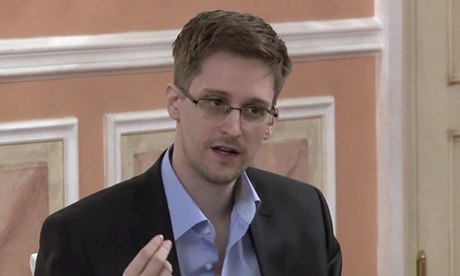Edward Snowden: I brought no leaked NSA documents to Russia
US whistleblower says he handed over all digital material to journalists he worked with in Hong Kong

Edward Snowden says there is no chance of leaked NSA documents falling into the hands of Russian or Chinese officials. Photograph: AP
Edward Snowden, the source of US National Security Agency leaks, has revealed that he left all the leaked documents behind when he flew fromHong Kong to Moscow and there was no chance of them falling into the hands of Russian or Chinese authorities.
In an interview with the New York Times (NYT), Snowden said he had decided to hand over all the digital material to the journalists he had met in Hong Kong because it would not have been in the public interest for him to hold on to copies. "What would be the unique value of personally carrying another copy of materials onward?"
Snowden disputed speculation that he had run the risk of China andRussia gaining access to the top secret files. He said he was so familiar with Chinese spying operations, having himself targeted China when he was employed by the NSA, that he knew how to keep the trove secure from them. "There's a 0% chance the Russians or Chinese have received any documents."
The 30-year-old said he had previously been reluctant to disclose that he no longer had the files for fear of exposing the journalists – Glenn Greenwald and Ewen MacAskill of the Guardian, and the independent filmmaker Laura Poitras – to greater scrutiny.
Snowden conducted the interview over the past few days, communicating from Russia, where he has been granted a year's asylum, with an NYT journalist in the US via encrypted email. He took the opportunity to try to quash several of the most widely aired criticisms of his actions.
Snowden insisted that he decided to become a whistleblower and flee America because he had no faith in the internal reporting mechanisms of the US government, which he believed would have destroyed him and buried his message for ever.
One of the main criticisms levelled at Snowden by the Obama administration has been that he should have taken up an official complaint within the NSA, rather than travelling to Hong Kong to share his concerns about the agency's data dragnet with the Guardian and other news organisations. But Snowden dismissed that option as implausible.
"The system does not work," he said, pointing to the paradox that "you have to report wrongdoing to those most responsible for it". If he had tried to sound the alarm internally, he would have "been discredited and ruined" and the substance of his warnings "would have been buried for ever".
Snowden's comments go to the heart of the dichotomy within the Obama administration's policy towards whistleblowers. It has introduced new protections for whistleblowers uncovering corruption and inefficiency, including a presidential order that extends the safeguards to the intelligence services. But contract workers, such as Snowden, are not protected by the executive order, and the government has pursued official leakers with an aggression rarely seen before.
Eight leakers, including Snowden, have been prosecuted under the 1917 Espionage Act – more than twice the number under all previous presidents combined.
Snowden singled out one of those eight, Thomas Drake, a former senior NSA executive who turned whistleblower after he became alarmed about the agency's choice of tools for intelligence gathering. Drake, who was prosecuted but had all the charges dropped, was in Moscow last week to honour Snowden with an award.
The author of the NYT article, James Risen, is himself at odds with the Obama administration. Risen uncovered the original warrantless wiretapping of phone calls by the Bush administration, for which he won a Pulitzer prize. He is under intense pressure to divulge the name of one of his sources at the criminal leak trial of Jeffrey Sterling, a former CIA agent who is another of the Espionage Act eight. Risen is refusing to reveal his source, and is likely to appeal right up to the US supreme court.
Snowden said it was a report on the wiretapping programme Risen uncovered that first piqued his curiosity.
He said he was shocked when he came across a copy of a classified report from 2009 dealing with the NSA's warrantless wiretapping under Bush. "If the highest officials in government can break the law without fearing punishment or even any repercussions at all, secret powers become tremendously dangerous."
He said his main objection to the NSA dragnet of data was that it was being conducted in secret. "The secret continuance of these programmes represents a far greater danger than their disclosure. It represents a dangerous normalisation of 'governing in the dark', where decisions with enormous public impact occur without any public input."
Snowden would not discuss the conditions of his life in Moscow. His father, Lon Snowden, returned to the US this week from a visit to see him and reported that "he's comfortable, he's happy, and he's absolutely committed to what he has done".

No comments:
Post a Comment